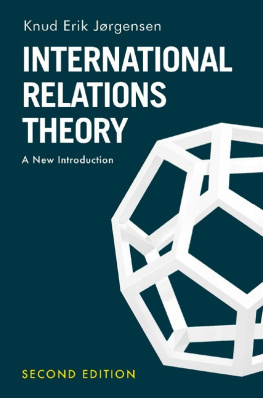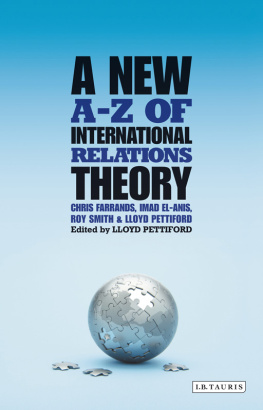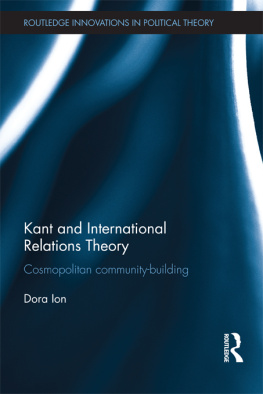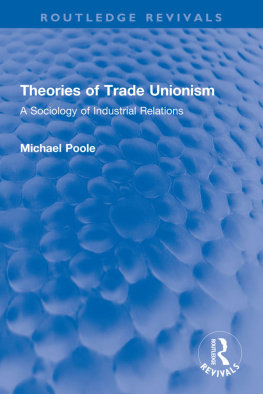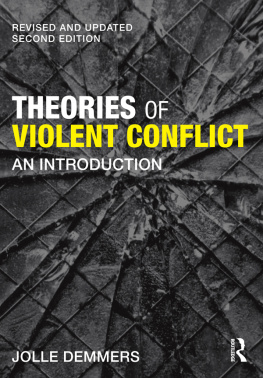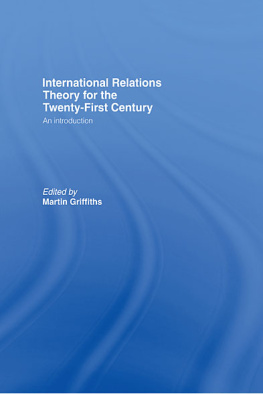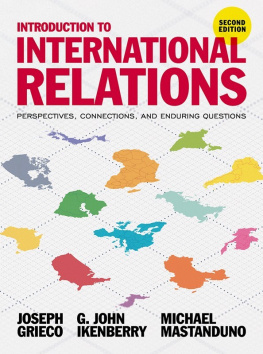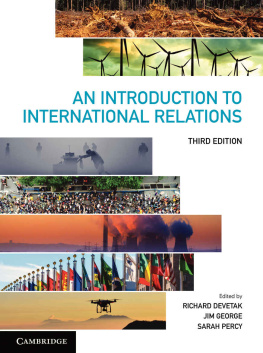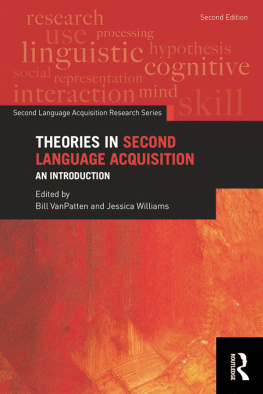International Relations Theory
Also by Knud Erik Jrgensen
European Approaches to Crisis Management (editor 1997)
Reflective Approaches to European Governance (editor 1997)
Constructing International Relations: The Next Generation (co-editor 2001)
The Social Construction of Europe (co-editor 2001)
Sage Handbook on European Union Politics (co-editor 2007)
Turkey and the European Union: Prospects of a Difficult Encounter (co-editor 2007)
The European Union and International Organizations (editor 2009)
European Democracy: Foundations, Milestones, Future Perspectives (co-editor 2009)
The Influence of International Institutions on the EU: When Multilateralism Hits Brussels (co-editor 2012)
Routledge Handbook on the European Union and International Institutions (co-editor 2012)
The Performance of the EU in International Institutions (co-editor 2013)
Theorizing Foreign Policy in a Globalized World (co-editor 2015)
Sage Handbook on European Foreign Policy (co-editor 2015)
Reappraising European IR Theoretical Traditions (co-author 2017)
International Relations Theory
A New Introduction
2nd edition
Knud Erik Jrgensen

Knud Erik Jrgensen 2018
All rights reserved. No reproduction, copy or transmission of this publication may be made without written permission.
No portion of this publication may be reproduced, copied or transmitted save with written permission or in accordance with the provisions of the Copyright, Designs and Patents Act 1988, or under the terms of any licence permitting limited copying issued by the Copyright Licensing Agency, Saffron House, 610 Kirby Street, London EC1N 8TS.
Any person who does any unauthorized act in relation to this publication may be liable to criminal prosecution and civil claims for damages.
The author has asserted his right to be identified as the author of this work in accordance with the Copyright, Designs and Patents Act 1988.
First edition published 2010
Second edition published 2018 by
PALGRAVE
Palgrave in the UK is an imprint of Macmillan Publishers Limited, registered in England, company number 785998, of 4 Crinan Street, London, N1 9XW.
Palgrave and Macmillan are registered trademarks in the United States, the United Kingdom, Europe and other countries.
ISBN 9781137604453 hardback
ISBN 9781137604460 paperback
This book is printed on paper suitable for recycling and made from fully managed and sustained forest sources. Logging, pulping and manufacturing processes are expected to conform to the environmental regulations of the country of origin.
A catalogue record for this book is available from the British Library.
A catalog record for this book is available from the Library of Congress.
List of Boxes, Tables and Figures
Boxes
Tables
Figures
List of Abbreviations
ACP | African, Caribbean and Pacific countries |
ASEAN | Association of South East Asian Nations |
CAP | Common Agricultural Policy |
CDA | Critical discourse analysis |
DIY | Do it yourself |
EBA | Everything But Arms |
EC | European Community |
ESDP | European Security and Defence Policy |
EU | European Union |
G21 | Group of 21 developing countries |
GATT | General Agreement on Tariffs and Trade |
GMO | Genetically modified organisms |
HNT | HumanNature tradition |
HST | Hegemonic stability theory |
ICC | International Criminal Court |
IGO | International governmental organization |
ILO | International Labour Organization |
IMF | International Monetary Fund |
IO | International organization |
IPA | International political anthropology |
IPE | International political economy |
IPEG | International Political Economy Group |
IPPA | International political post-anthropology |
IPT | International political theory |
IR | International Relations |
ITO | International Trade Organization |
LDC | Least developed countries |
MBA | Master of Business Administration |
MTCR | Missile Technology Control Regime |
NATO | North Atlantic Treaty Organization |
NGO | Non-governmental organization |
NIEO | New international economic order |
ODA | Overseas development aid |
OECD | Organisation for Economic Co-operation and Development |
OSCE | Organization for Security and Cooperation in Europe |
PCR | Polymerase chain reaction |
PPT | Post-positivist tradition |
RIPE | Review of International Political Economy |
SARS | Severe acute respiratory syndrome |
SDT | Structural discourse theory |
UK | United Kingdom |
UN | United Nations |
UNESCO | United Nations Educational, Scientific and Cultural Organization |
US | United States |
USA | United States of America |
USSR | Union of Soviet Socialist Republics |
WHO | World Health Organization |
WTO | World Trade Organization |
Preface and Acknowledgements
It is a key feature of mature disciplines that they engage, from time to time, in critical self-reflection. While such reflections are intriguing and rewarding in their own right, a major motivation for writing this book is my conviction regarding the importance of incorporating them into the textbooks used to introduce the discipline and its theories. The design and conception of this book has, therefore, been strongly influenced by the fruits of my own research on the genesis and development of the discipline, in particular on the trajectories of European International Relations (or IR) theory, the genesis and origins of International Relations theory more generally and the benefits and pitfalls of aspiring to make International Relations a truly global discipline.
About seven years ago I finished the manuscript for the first edition, which coincided with the beginning of the global financial crisis and the relative decline of the West. Whereas I prepared the first edition in a village outside Aarhus, Denmark, most of the work on the present edition was done in Izmir, Turkey. The dynamics of world politics and economics as well as the change of coordinates prompt fresh perspectives on global affairs and I think the second edition somehow reflects the changes. The new edition also includes a new chapter, specifically about what ended up being called the HumanNature tradition. We live in an era characterized by climate change, environmental challenges and profound advances in biotechnology as well as in the life sciences more generally, hence this is a perfect time to (re-)consider how theorists theorize the relationship between human beings and their material environment, especially the international or global dimensions of the relationship.
Next page
